Posted: March 12th, 2012 | 1 Comment »
Talking of Suzie Wong in Hong Kong let’s go back a little further – to 1907 in fact and below some ads for hotels from the South China Morning Post and The China Mail in that year.Well done the Connaught Hotel and manager Mr Moses for being HIGH-CLASS and under strictly American management (was this supposed to impress in a “strictly” British colony!!). Ice House Street of course remains in Central but the buildings that would have housed the Carlton House Hotels are long gone I’m afraid. I have to say Kowloon-side sounds more fun with billiards and bowling and who can resist a “modern management”.
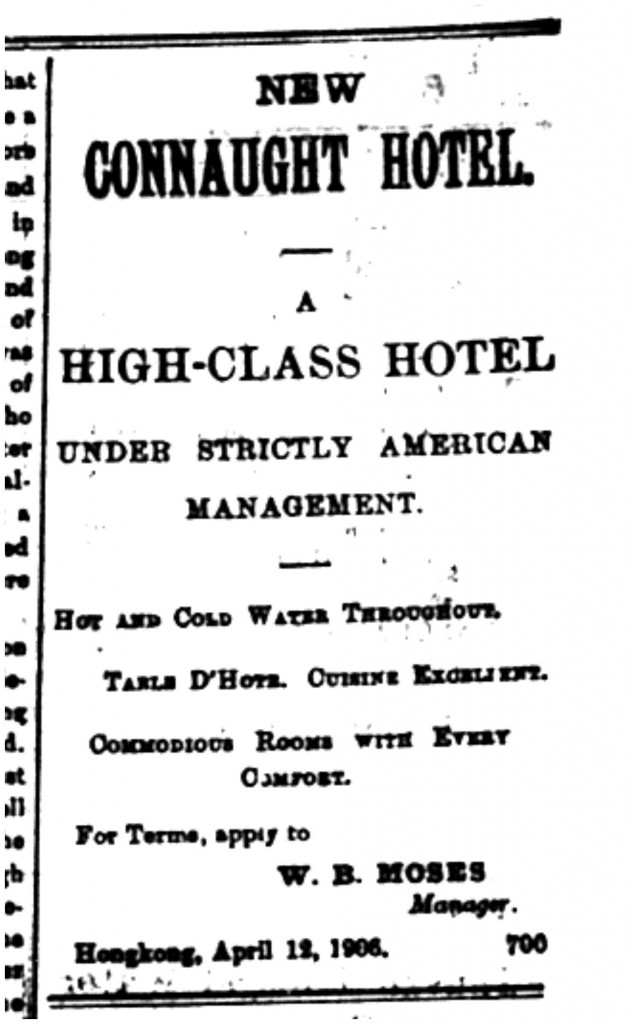


Posted: March 11th, 2012 | No Comments »
A little advance notice of an upcoming event:
China in Britain: Myths and Realities
China in Britain #1. Film
May 10th 2012 – Time: 10.00 am – 6.00 pm
Room 451, 309 Regent Street, London W1B 2UW
The Chinese presence in British cinema dates from James Williamson’s 1900 ‘documentary’ film, Attack on a China Mission, a recreation of that year’s ‘Boxer rebellion’ in which nationalist militants attempted to expel Christian missionaries and other foreigners from China. It was actually filmed in Brighton and Williamson had never visited China. A ‘yellow-face’ tradition followed, most popularly the Fu Manchu movies stretching through to the 1970s craze for kung fu – not until the early 1980s did Asian-British filmmakers finally make some inroads into the British film industry. In 1986 the first truly Chinese-British feature, Ping Pong (1986), reached the screen. Directed by the British-born director Po-Chi Leong, who had directed several features in Hong Kong, the film was set in London’s Chinatown, with a largely unknown cast – except for David Yip, best known as TV’s The Chinese Detective (BBC, 1981-82). Though critically lauded, however, the film failed to find the success it deserved, and neither it nor Mike Newell’s Soursweet (1988) adapted from Timothy Mo’s novel and scripted by Ian McEwan, has so far heralded the arrival of a healthy British-Chinese cinema. While China, Taiwan and Hong Kong-based directors like Zhang Yimou, Ang Lee and Wong Kar-Wai achieved arthouse and now mainstream success in Britain, other British-Chinese features such as BBC Film Peggy Su! (dir. Frances-Anne Solomon, 1998), failed to receive a proper release, despite favourable reviews. More recently Guo Xiaolu’s award winning film, She, A Chinese (2009), a British film in terms of its financing and much of its location, also failed to achieve due recognition from the film trade press and distributors. However a new generation of British-born or British-based Chinese are at the vanguard of positive change, amongst them University of Westminster alumna, Jo Ho, who created the hit BBC television show, Spirit Warriors (the first British series to star a predominantly East Asian cast) and who is now working on several feature films, and award winning director, Belfast born Lab Ky Mo (who will be speaking alongside Soursweet director Mike Newell, China in Britain #2 May 31st).
Programme : RSVP – Places are free but strictly limited so it is essential to register
anne@translatingchina.info
10.00 Coffee/welcome Anne Witchard, Principal Investigator, and Diana Yeh, Project Research Fellow
10.30 ‘Peking at the Pictures: Early Cinema, the Boxer Rebellion, and Anglo-American Perspectives on China’, Ross Forman (University of Warwick).
11.30 ‘Po-chih Leong, Britain’s Forgotten Filmmaker’, Felicia Chan (University of Manchester) and Andy Willis (University of Salford).
12.30 – 2.00 lunch
2.00 – 2.45 Jo Ho will talk about her work.
2.45 Tea
3.00 Guo Xiaolu (Author and filmmaker) will introduce a screening of her film She, A Chinese followed by Q and A
China in Britain: Myths and Realities is an AHRC funded research network project. Its central aim is to investigate changing conceptions of China and Chineseness in Britain. More details on the series of conferences below – the first is on film and looks good
In the light of China’s emerging global profile as a country of major economic and political impact, Chinese visibility is undergoing significant transformations. Interest in Chineseness has seen an upsurge concomitant with that of our interest in fostering economic relationships with China. Yet when government leaders across Europe are pronouncing the failure of multiculturalism what does it mean to be integrated in Britain as a visible minority? The ultimate aim of the project is to contribute to the ongoing reformulation of both British and Chinese cultural understandings in the context of a multicultural Britain still structured by racialised inequalities and Orientalist stereotypes. Although the British-Chinese voice has been marginal in mainstream cultural and political life it is beginning to make itself heard. This project will explore the current and potential future course of Chinese-British relations and the place of history within it.
A series of day colloquia at the University of Westminster in five different subject areas* will connect up the important yet disparate work being done by cultural historians, literary critics, curators, archivists, contemporary artists, film makers and Sino-British organisations. In bringing these specialists together, the project aims to provide a high profile platform for the discursive elaboration of the changing terms of engagement between British and Chinese people and to widen the terms of debate from diaspora studies and simplistic reductions around identity to an inter-disciplinary network of research practice relevant to contemporary debate.
Posted: March 10th, 2012 | No Comments »
A very interesting interview in the Wall Street Journal here with the masterful writer Amitav Ghosh on his new book (the second in the Ibis trilogy) River of Smoke. In the book he skillfully recreates Canton in the 1820s and 1830s and here talks about how he goes about doing that. Click here

Posted: March 10th, 2012 | No Comments »
Regular readers will know that I do occasionally abuse this blog for a wee bit of self-promotion. And this is one such occasion:
1) I’m back in the charts at Dymocks Hong Kong Book Sales Chart – after riding high in the Hong Kong chart for a while last year (until that Steve Jobs bio came out!!) I’m back at No.9 this week!!
2) I also got a good write up coming out of Adelaide Writers’ Week – which is good, because I loved it down there and want to get asked back!!
3) I’m at the Chengdu Bookworm tonight (Saturday) with my old friend, hotelier and bon-vivant man-about-town in Chengdu William Hall moderating – so if you’re in Sichuan (and if not, why not?) do pop along.

Posted: March 10th, 2012 | No Comments »
As usual the blurb and cover below for Stephen Platt’s Autumn in the Heavenly Kingdom.
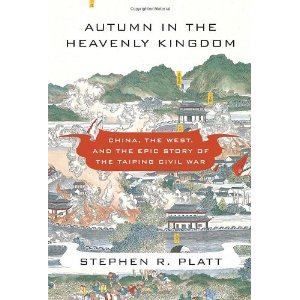
A gripping account of China’s nineteenth-century Taiping Rebellion, one of the largest civil wars in history. Autumn in the Heavenly Kingdom brims with unforgettable characters and vivid re-creations of massive and often gruesome battles—a sweeping yet intimate portrait of the conflict that shaped the fate of modern China.
The story begins in the early 1850s, the waning years of the Qing dynasty, when word spread of a major revolution brewing in the provinces, led by a failed civil servant who claimed to be the son of God and brother of Jesus. The Taiping rebels drew their power from the poor and the disenfranchised, unleashing the ethnic rage of millions of Chinese against their Manchu rulers. This homegrown movement seemed all but unstoppable until Britain and the United States stepped in and threw their support behind the Manchus: after years of massive carnage, all opposition to Qing rule was effectively snuffed out for generations. Stephen R. Platt recounts these events in spellbinding detail, building his story on two fascinating characters with opposing visions for China’s future: the conservative Confucian scholar Zeng Guofan, an accidental general who emerged as the most influential military strategist in China’s modern history; and Hong Rengan, a brilliant Taiping leader whose grand vision of building a modern, industrial, and pro-Western Chinese state ended in tragic failure.
This is an essential and enthralling history of the rise and fall of the movement that, a century and a half ago, might have launched China on an entirely different path into the modern world.
Posted: March 8th, 2012 | No Comments »
I’ll be up in Chengdu at the Bookworm International Literary Festival there that’s running in March at the Chengdu Bookworm – details here. Nice place, nice people and I haven’t been up that way for a couple of years so keen to revisit and have a look round. I’m doing a couple of events – one on Midnight in Peking and another with Derek Sandhaus which is a workshop on getting published. Details below. If you’re in Chengdu do come along and say hello.
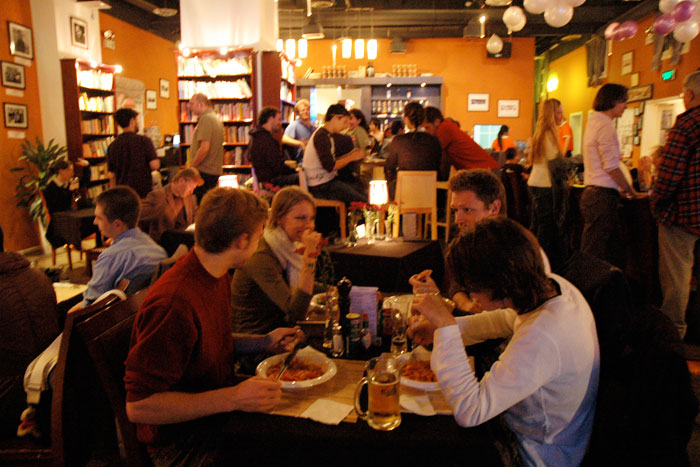
Paul French’s true-crime page-turner, Midnight in Peking, delves deep into Beijing’s sordid demimonde. On the cusp of WW II, the brutal murder of 19-year old Pamela Werner, a daughter of a British diplomat, shocked and paralysed 1930s Beijing. Join us for a special event as Paul takes us up close and personal to the seedy and fascinating characters of the Badlands and Legation Quarter. Plus, don’t miss a special display of archival photographs, recordings and more that French unearthed. Paul French studied history, economics and Mandarin in London and has an M. Phil. in economics from the University of Glasgow. He is now based in Shanghai as a business advisor and analyst. He is the author of multiple works of Asian History; Carl Crow: A Tough Old China Hand, North Korea: The Paranoid Peninsula, and Through the Looking Glass: China’s Foreign Journalists from the Opium Wars to Mao.
What does it take to become a published author? Learn effective steps and techniques for getting published from two prolific China-based authors who have had several of their own titles published, and who have helped many other writers get their work into print. Paul French and Derek Sandhaus will offer their insights into the world of manuscripts, proposals, query letters, rejection letters, agents, editors, publicists, contracts, and other potentially perplexing elements of the publishing industry. Paul French (Midnight in Peking, Through the Looking Glass) has worked with the full range of publishers, from small independent labels, to university presses, to a major multinational publisher, Penguin, with his latest title. He is also a commissioning editor in his own right and is currently managing two book series, Asian Arguments and China Monographs. Derek Sandhaus (Tales of Old Peking, Décadence Mandchoue) served as chief editor/general manager of Earnshaw Books from 2009 to 2011, during which time he oversaw the publication of dozens of internationally released titles under the Earnshaw label.
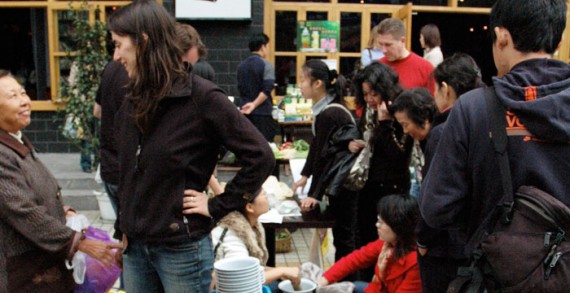
Posted: March 8th, 2012 | No Comments »
Running around Hong Kong the other week I note that two venerable institutions are celebrating their hundredth anniversary’s: the Bank of China and Hong Kong University.
Here’s a link to the BoC’s history page
And here’s a link to a special site celebrating HKU’s centenary
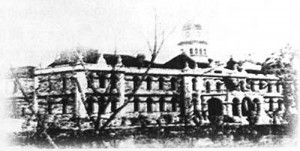
BoC’s first home – a now long gone building on Shanghai’s Hankow (now Hankou) Road
Posted: March 7th, 2012 | No Comments »
It’s all getting underway in Beijing once again for their annual March Literary Festival. I’ll note here some events that are part of the Beijing International Literary Festival that are China-related and that don’t feature me! All details on the Festival site here.
Tales From the Countryside – March 10 – 10:00 – Journalist Liang Hong has spent years investigating the lives of those living in rural China. As the country becomes increasingly urban and the young gravitate towards cities for employment and opportunity, what is happening to the countryside? How are those left behind in the farms and villages affected by the changes of modern China? Hear Liang Hong share their stories and her predictions for the future of an ancient way of life. Moderated by Qin Liwen of International Crisis Group. In Chinese with English translation.
Tiger Head, Snake Tails: China Today, How it got there and where it is going – March 10 – 12:00 – Economists, policy makers and armchair historians alike have made popular sport debating the future role of China. Will China rule the world? Or is all just smoke and mirrors? Historian and journalist Jonathan Fenby, author of The Penguin History of Modern China, proposes the answer is both – and neither. In his latest book Tiger Head, Snake Tails, Fenby argues that the future of China is much like its past – nuanced and complex. Through extensive research, on-the-ground reporting, interviews and more, Fenby presents a dynamic and holistic picture of China’s future, both at home and abroad. Brought to you by Rutgers Business School.
The Death of Mao and the Birth of the New China – March 11 – 12:00 Summer 1976. One of the worst earthquakes on record struck Tangshan, killing over a quarter of a million people. In nearby Beijing, the Communist Party was being torn apart as various factions vied for power. In the wake of Mao’s death, would the Gang of Four take control or would Deng Xiaoping bring about reform and reopen China to the world? James Palmer’s latest work of non-fiction, The Death of Mao, recreates the tensions of that tumultuous summer when China’s fate hung in the balance and discusses how these events created the New China.
A Wanderer’s World – Chinese Travel Writing – March 11 – 14:00 – Travel writing has a long history in the West extending back to before Marco Polo. Now as a growing Chinese middle class strikes out to explore the globe, a new crop of Chinese travel writers are documenting these travels. Xu Zhiyuan, editor-in-chief of the Chinese edition of Business Weekly and a FT contributor, is one of these pioneers. Join us to hear Xu speak on his latest book, A Wanderer’s World (一个游è¡è€…的世界), which chronicles his adventures and journeys around the globe.
Knifepoint – Chinese Spy Thrillers – March 14 – 18:00 – Mai Jia is China’s best-known author of spy thrillers. His popular works mix intrigue with romance and have been awarded the Mao Dun Literature Prize and adapted into films and television programmes. His latest novel Knifepoint (åˆ€ä¹‹é˜³é¢ and 刀之阴 é¢) tells the story of two undercover agents – a man working for the Kuomintang and the female Communist spy who seduces him – set against the backdrop of war and chaos. Join us as Mai Jia discusses espionage, seduction and thrill of the chase. In Chinese with English translation. Brought to you by Blue Frog.
China in Ten Words – March 14 – 20:00 – In his latest work, China in Ten Words, the acclaimed author of Brothers and To Live Yu Hua turns his pen to non-fiction. He frames the Chinese experience over the last several decades with ten common phrases: “people,†“leader,†“reading,†“writing,†“Lu Xun,†“disparity,†“revolution,†“grassroots,†“copycat†and “bamboozle.†Listen as Yu Hua gives his candid take on China’s meteoric economic and social transformation, mixing personal stories and astute analysis. In Chinese with English translation. Brought to you by Harrow International School Beijing.
City of the Dragon – March 15 – 20:00 – Di An is one of China’s most buzzed about young writers. Part of the ’80s generation, Di An’s works explore the complexities of modern relationships in China. Her books The City of the Dragon I & II (西决) were runaway bestsellers in China. Join us to hear from one of China’s most promising new voices. In Chinese with English translation.
Red Rock – Rock n Roll in China – March 17 – 16:00 – Rebellious, individualistic, explosive rock and roll seems at odds with modern Chinese society. But Jonathan Campbell’s book Red Rock explores how rock in China has evolved its own unique homegrown sound and style. Join us as Campbell discusses with music critic Hao Fang the long strange journey of Chinese rock from Mao to the present – and where this thriving underground scene is headed. Moderated by Nathaniel Davis of Split Works and JUE. This event is also part of the JUE festival.
Foreign Concession – March 17 – 18:00 – 1930s Shanghai has long provided inspiration for writers and artists. The potent intersection of glittering high society, seedy dens of iniquity, politics, violence and the whispers of war provide a perfect backdrop to Shanghai writer Xiao Bai’s acclaimed novel Foreign Concession (租界). Hear Xiao Bai on his story of a French-Chinese photographer who becomes entangled with international gunrunners, terrorists and a corrupt police force. In Chinese with English translation.
Walking Tour – Literary Beijing – March 18 – 14:00 – We take a special trip by foot through the old Beijing where great Chinese writers wrote, drank, debated and created. More information at The Bookworm.
Celluloid Dreams – March 20 – 13:00 – The Chinese film industry is the third largest in the world and growing bigger every year. With the audiences’ unending appetite for new stories, studios are looking to novelists and short story writers for tales to bring from the page to the screen. Authors Zhu Wen (I Love Dollars) and Murong Xuecun (Leave Me Alone: a Novel of Chengdu) discuss the process and challenges of writing for Chinese cinema. In Chinese with English translation.
Tibet: The Harmonious Land – March 21 – 18:00 – Sichuan-native Fan Wen’s best-selling novels delve deep into the complex interaction between culture, religion and national identity in Tibet. Drawing on his personal experience and historical accounts, Fan created his epic trilogy A Tibetan Three-Movement Song (Harmonious Land 水乳大地, Compassionate Land and Elegant Song of the Land). Join us to hear Fan talk about the tangled interactions between ethnic minorities, Han culture and foreign missionaries on the Tibetan plateau. In Chinese with English translation.
Chick-lit with Chinese Characteristics – March 22 – 18:00 – Chick-lit with a twist. A Chinese national and Korean ethnic minority, Jilin-native Jin Renshun’s novels and short stories delve deeply into the unstable relationships between the sexes in modern China. Her work looks at contemporary society through an introspective lens. Come hear this unique voice on who is winning the battle of the sexes in China today. In Chinese with English translation.
The Maker of Heavenly Trousers – March 23 – 18:00 – Originally published in 1935, diplomat Daniel Varè’s The Maker of Heavenly Trousers, is a fascinating and evocative look in to a Peking of a different era. Set amidst the bustle of a frenzied city, this China classic tells a fascinating tale of love, loss and humanity. In a home staffed by mischievous servants, an unnamed bachelor finds himself falling in love with his ward. Competing with eccentrics, millionaires and Rasputin’s former mistress for his ward’s affections, he can’t stop her from falling under the spell of Eastern hypnosis and his charmed and charming world very nearly comes crashing down around him. We’ve gathered a panel of old China hands to discuss and debate Varè’s infamous work.








